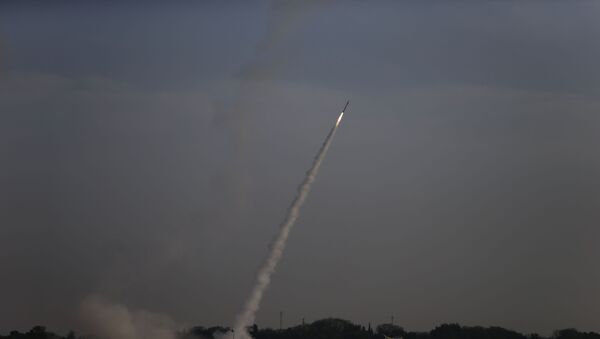Sirens went off in Israel's southern city of Sderot and the area nearby on Friday night after seven projectiles that were launched from the Gaza Strip exploded.
The Iron Dome aerial defence system intercepted all of the launches, the Israel Defence Forces said. No casualties were reported. Calm was restored.
But Hadas Paternak-Sasi, who lives in Miflasim, a kibbutz close to Sderot that's located only 1.3 km away from the border with Gaza, says it is all relative.
"We are used to this reality. Once escalation occurs, all eyes are on us, but when rockets stop falling, the government tends to forget about our existence," she complained.
The first rockets started falling on Israel's southern communities in 2001, but the situation deteriorated after former Prime Minister Ariel Sharon decided to evacuate Israeli settlements from Gaza in 2005.
Tensions continued to escalate following Hamas' brutal takeover of Gaza in 2007. A year later, Israel launched its operation Pillar of Defence to put an end to the barrage of rockets and prevent Hamas from digging tunnels that would be used to attack Israel's southern communities.
Scary reality:
Hadas, who has been living on the kibbutz for 15 years, believes she has seen it all. During the 2014 Gaza War, "one of the rockets that fell close to our house broke our window. It was very dramatic for us because that same rocket could have killed us had it been a direct hit," she recalled.
Those living next to the Gaza border have under a minute to hide in a bomb shelter - located almost in every home. In Hadas' case it is only 15 seconds. And she said her five kids are all trained to react immediately once the sirens go off.
No place like home:
But although she feels tired of the situation, she doesn't want to leave. "My kids were born here, that's their home and they don't know anything different," she said, adding that southern communities provide people with a high quality of life.
"The atmosphere here is great, the people are high class. Kibuttz gives kids good education and freedom but we all lack one basic thing - security," she stressed.
Hadas believes that the Israeli government is not doing enough to protect its citizens simply because the population living in the southern communities will never demand that the government provide for their security.
"People living here will never put their foot down and demand their rights. They will never show a weakness and will just go on with whatever situation is thrown their way," she said, adding that the government must invest more money and effort in an attempt to improve the situation of southern communities.
Several months ago, Israel's government allocated some three million dollars to various trauma centres located across the border with Gaza. An additional 6.8 million was given to centres providing children with psychological counselling. Residents have also received significant tax reductions, discounts and other benefits, including multi-million dollars grants, assistance in the development of small businesses and funding for kindergartens.
But Hadas says it is not enough. "I want the government to look for a political solution from dust [sic] till dawn. Only when and if they exhaust all options, only then can they wage a war against Hamas. Past experience shows that wars don't solve anything. Every war ends with a political deal. It has to happen in our case too," she concluded.





